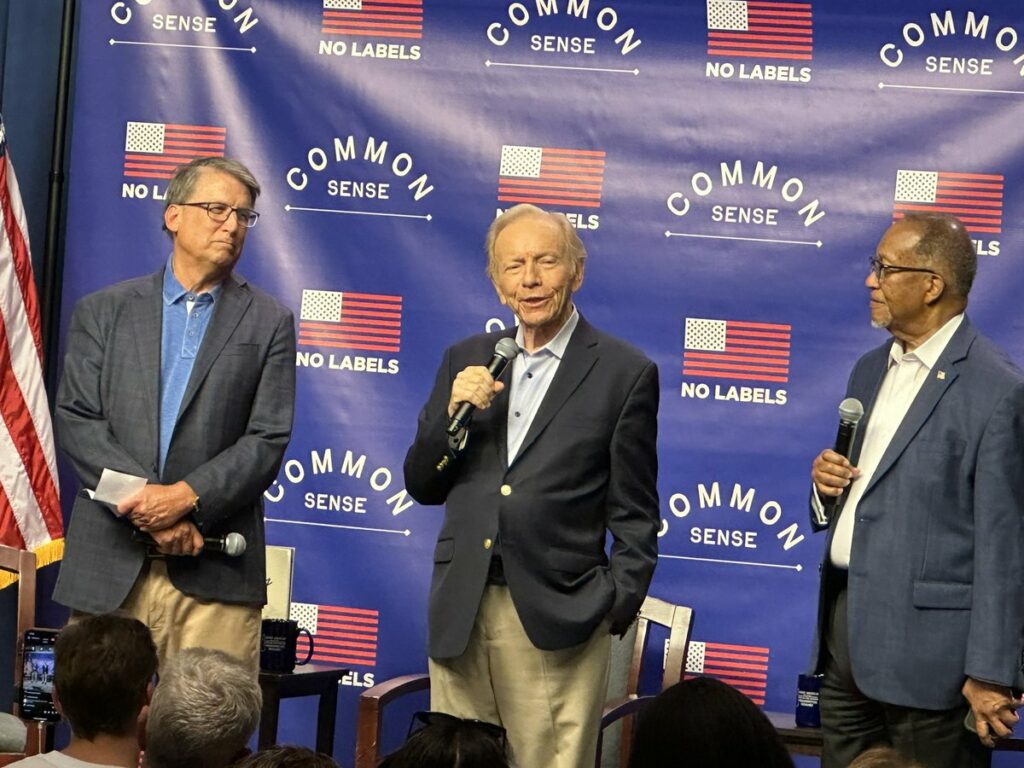It took three overflow rooms to accommodate the crowd that showed up for the No Labels launch at the New Hampshire Institute of Politics Monday night, evidence of a desire among voters for an alternative to a Biden-Trump re-match.
But when it was over, the event had revealed some of the challenges facing the third-party effort to energize what one participant called the “mushy middle” in an era of polarized politics.
The No Labels lineup was impressive, with former NAACP executive director Dr. Benjamin Chavis kicking off the program and setting the tone.
“My background is civil rights. I’m a Democrat, but I’m working with Republicans. I’m working with independents. I’m working with Americans. We’re putting nation before party. We’re putting democracy before party,” Chavis said.

He was joined by the 2000 Democratic vice presidential nominee, former Sen. Joe Lieberman, who recounted the “No Labels” movement’s work over the past decade and the successes of the Problem Solvers Caucus in the U.S. House.
Former North Carolina GOP Gov. Pat McCrory followed with the organization’s strategic pitch. “Our first goal is to influence the agenda of politicians that are coming to New Hampshire and to other states during this primary season. Because if we can influence them with this common sense agenda that we put forward, then we’re making a difference in this election already,” McCrory told the crowd.
“The second thing we want to do… as part of our insurance policy, is to gain ballot access,” McCrory added.
“And the third thing I want to make you aware of — and we hope we won’t have to do it — but if by Super Tuesday we see the final two candidates frankly being Donald Trump and Joe Biden…we will present a president and vice president candidate on a No Labels ticket, we plan to do that,” McCrory said. “But only if we see we have an opportunity to win.”
Critics point out that while the strategy may make sense, it is hard to inspire supporters with the message that your organization might mount a political campaign in the future with a to-be-determined slate of candidates. No Labels insisted Monday’s event was to highlight its 67-page, 30-point “Ideas of the Common Sense Majority” and its centrist positions on a range of issues like immigration, education, federal spending, and guns — and not to kick off a presidential campaign.
But when the program began, with West Virginia Sen. Joe Manchin (D) and former Utah Gov. Jon Huntsman (R), the potential candidates quickly overwhelmed the platform. As one attendee put it, “I learned a lot about what Jon Huntsman thinks about the issues; I learned a lot about what Joe Manchin thinks about issues. But I didn’t learn anything about No Labels and the issues.”
One problem was their choice of moderator, Kevin Cirilli, a correspondent for Scripps News. Rather than opening the door for a conversation about the No Labels platform, Cirilli spent the first part of the event grilling them about their potential plans to run for the White House.
Manchin, whose been asked that question repeatedly over the past month and didn’t seem thrilled to get it again, bristled when Cirilli suggested he would be a “spoiler” candidate on the No Labels ticket who would help Trump and hurt Biden.
“I’ve never been in any race I’ve ever spoiled. I’ve been in races to win,” Manchin said. “And if I get in a race, I’m going to win.”
Manchin has repeatedly said he would decide on a possible third-party bid for president next year, which fits into the No Labels schedule of holding a convention next April.
Manchin and Huntsman took questions from the audience on topics including the No Labels “all of the above” approach to energy policy, budget deficits, and gun control. Several times the two offered differing policy approaches, inspiring the moderator to ask Huntsman how the No Labels concept of a fusion ticket — a Republican and a Democrat — would work logistically in the White House.
“A hell of a lot better than it does now,” Huntsman quipped.
Through it all, the crowd remained mostly silent, with just a few rounds of applause — the loudest when Manchin urged a return to patriotism and promoted the No Labels proposal for a national service program. (Huntsman’s mention of his work with Sen. John McCain also inspired a spontaneous smattering of applause.)
“I think we need this kind of conversation that America is indeed great,” said Graham Warner of Bedford, N.H. “None of this ‘make it great again. America is great, the greatest country in the world.’
“The basic message tonight was that our politics is responding to the extremism and not what the majority of the people want,” Warner added.
Janet Gagne of Hooksett said she had attended events at the NHIOP in the past. When she told friends she planned to attend the No Labels event, “I got a response from a lady who is definitely a Democrat and against No Labels. She just really felt that it was going to interfere in the election.”
There is a growing sentiment among Democrats that a bipartisan fusion ticket would hurt Biden’s re-election chances, a sign of just how weak they believe their party’s likely nominee would be in a general election.
Dem state party chair Ray Buckley has aggressively attacked this third-party push, calling it “an attempt to knock out President Biden and pave the way for another four years of scandal and division with Donald Trump.”




